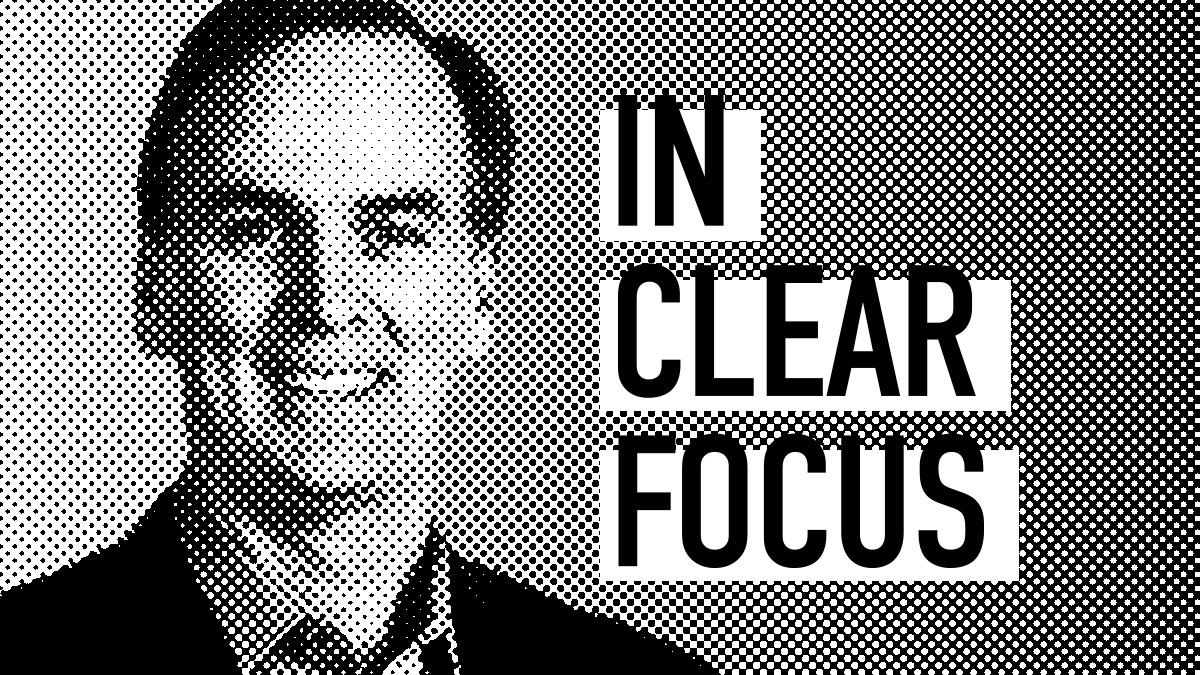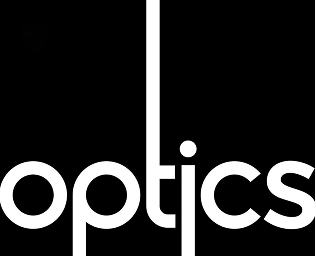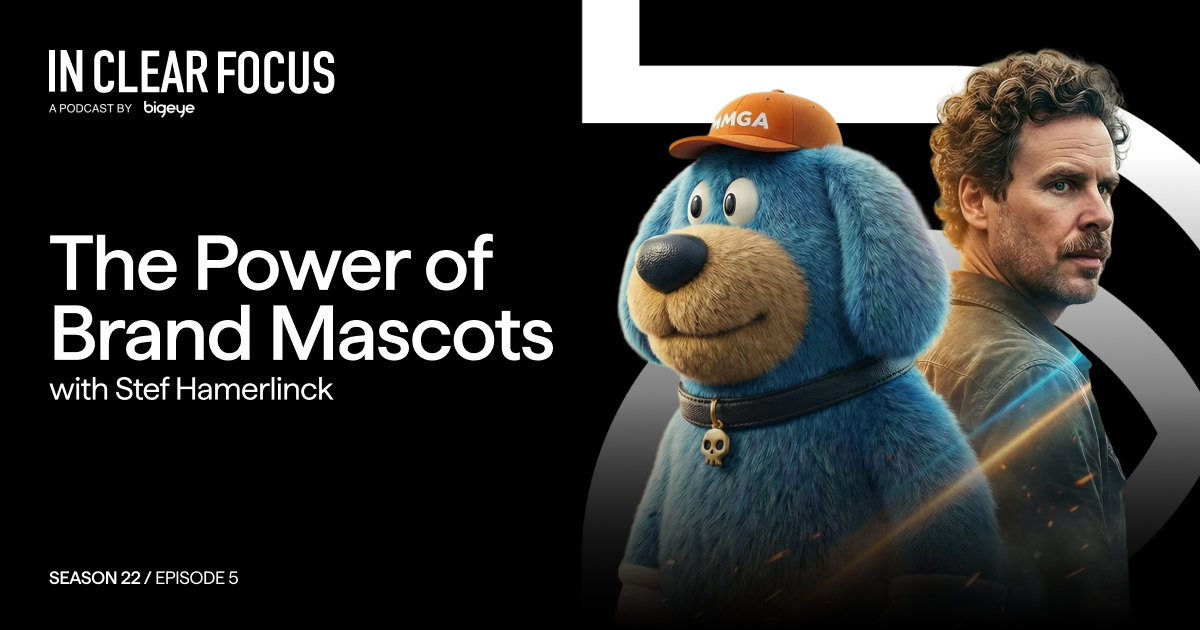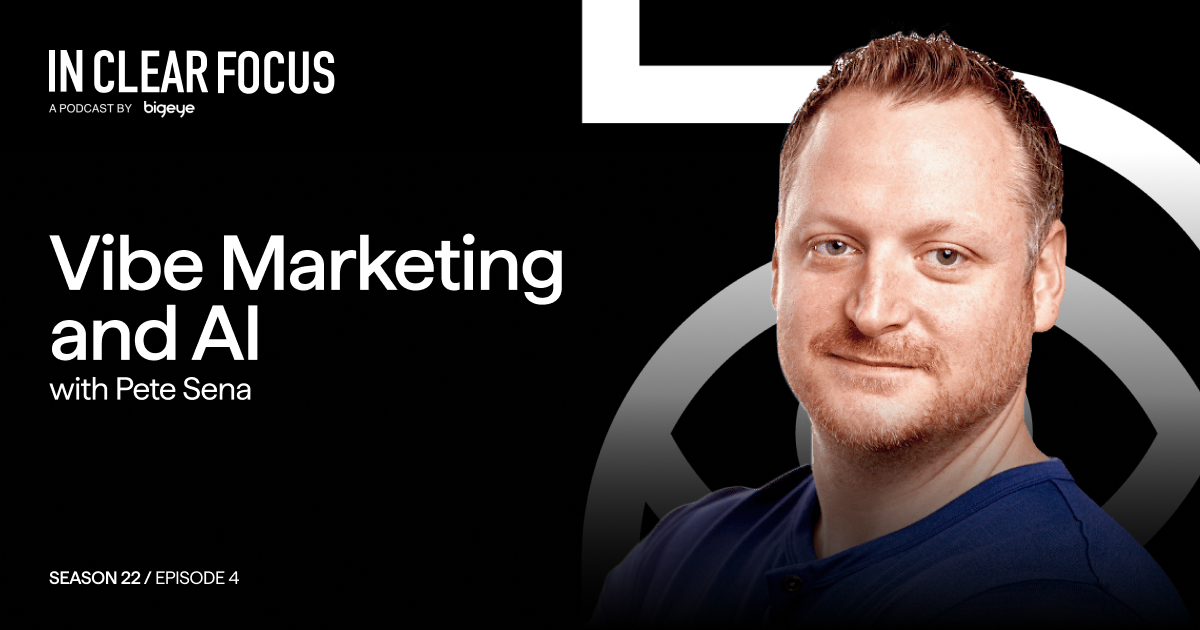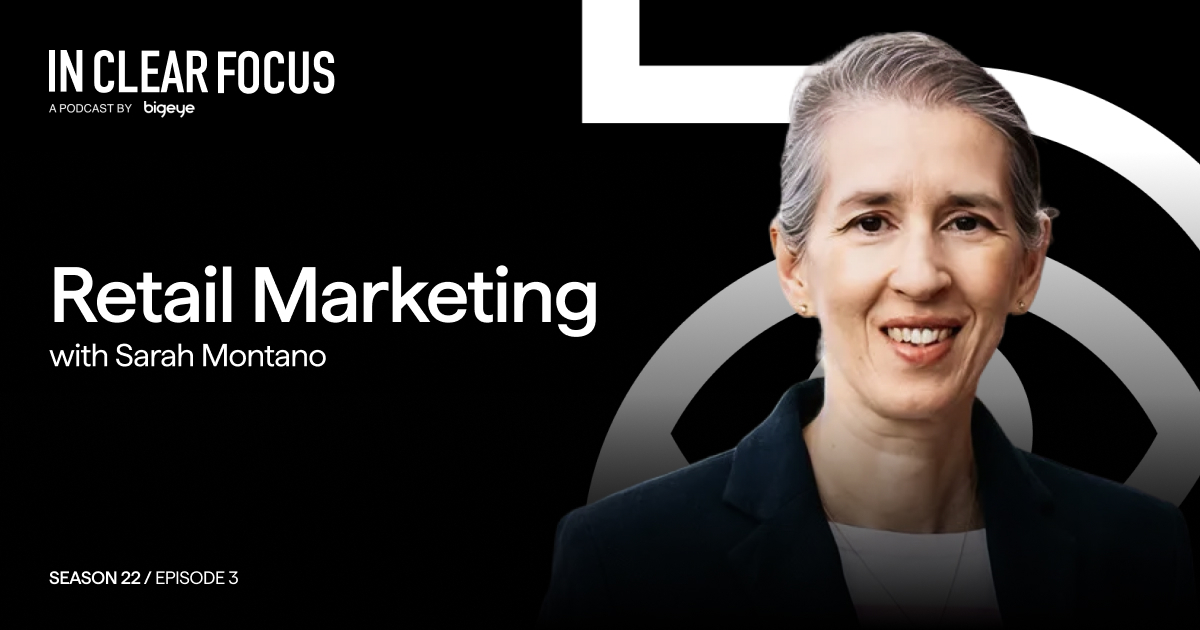The US market for CBD is booming. Michael Law joins us on IN CLEAR FOCUS to discuss practical guidance for CBD marketing and retailers to maximize results.
IN CLEAR FOCUS: The US market for cannabidiol. Michael Law of contract manufacturer Eagle Labs shares his observations about the opportunities and potential pitfalls for anyone introducing new CBD products to this booming market. With a background in traditional CPG sales and marketing, Michael offers practical guidance for CBD brands and retailers to maximize results.
In Clear Focus listeners can exclusively take advantage of a special discount code to receive 50% off a purchase from Eagle Labs’ new line of CBD products: go to IMPIRICA.co and enter the code BIGEYE at the checkout.
Episode Transcript
Adrian Tennant: You’re listening to IN CLEAR FOCUS, a unique perspective on the business of advertising produced weekly by Bigeye. Hello. I’m your host, Adrian Tennant, VP of insights at Bigeye, an audience-focused, creative-driven, full-service advertising agency. Bigeye is based in Orlando, Florida, but serves clients across the United States and beyond. We provide audience research, strategy, branding, creative, media, and analytics services. Thank you for choosing to spend time with us today. A couple of weeks ago we talked about the legal considerations surrounding CBD product marketing. On this week’s show, we’re focusing on CBD product manufacturing. Cannabidiol, or CBD, is a chemical compound from the cannabis plant. It’s used in products like oils and edibles to impart a feeling of relaxation and calm. Unlike THC, its cousin, CBD is not psychoactive. Today, CBD is available in tinctures and pills intended to relieve conditions such as anxiety and arthritis pain, and you’ll see it as an ingredient in a growing range of consumer categories from food and beverages to beauty products and apparel. As a CBD marketing agency, Bigeye enjoys working with the entrepreneurial innovators in this space. And today it’s my pleasure to welcome a guest with a unique perspective on the rapidly growing market for CBD products. Michael Law is the Chief Commercial Officer of Eagle Labs, based in Saint Petersburg, here in Florida. Eagle Labs manufactures high-quality, rigorously-tested nutritional supplements and skincare products. The company provides formulation and manufacturing services for private label lines. Under Michael’s direction, Eagle Labs has quickly become a leader in the CBD category, not only manufacturing products on behalf of its clients, but also developing its own CBD product range. The company also offers packaging, design, consulting, and fulfillment services. And Eagle Labs is a Food and Drug Administration-registered facility. Welcome to IN CLEAR FOCUS, Michael.
Michael Law: Thank you Adrian. It’s great to be here.
Adrian Tennant: I gave a summary overview of CBD at the top of the show, but could you give us a bit more of a detailed explanation of what CBD is and how it’s produced?
Michael Law: Yes, absolutely. And to be clear, there’s a lot of confusion around what CBD is and isn’t. I’ll give you a layman’s explanation of what CBD is. CBD is really a naturally occurring compound as I think you said at the beginning of the podcast. It’s found in industrial hemp plants. It’s important to differentiate between the industrial hemp plant and marijuana. These plants are cousins, but industrial hemp is really what the Farm Bill, the federal Farm Bill approved for cultivation, transport, research, and sale. CBD can support a sense of peace and wellness in humans and animals, as it interacts with the body’s natural endocannabinoid system. It’s not intoxicating and that’s one of the biggest myths about CBD, so you can add it to your everyday routine without experiencing a high. A lot of consumers are also concerned about safety and we’ll talk more about what Eagle Labs is doing to ensure the safety of our products. But there has been a report from the World Health Organization that stated that in humans, CBD exhibits no effects indicative of any abuse or dependence potential. So they haven’t found any evidence of public health issues or problems associated with the use of pure CBD. So I mean, at the outset, I think it’s important to know that CBD has a very strong safety profile and that it is very distinct from marijuana in that it will not make you high. And it is federally legal.
Adrian Tennant: Right, by some estimates, the US market for CBD will be worth anything between 16 and 22 billion dollars annually within just a couple of years. Why is the market for CBD products growing so rapidly?
Michael Law: The reason that it’s growing so rapidly is that consumers are using the product and they’re experiencing the effects that they’re seeking. So the repeat purchase levels are very high. There’s a lot of online communication that’s happening where people are sharing their stories with each other. We get a lot of testimonials, even video testimonials from people that have tried our products are just indicating that the product has exceeded their expectations in terms of the benefits that they’re seeking either for themselves or for their pets. We believe that the category is probably in the one to two billion dollar range right now. Most of the category is not what we would call measured by agencies like AC Nielsen or IRI – syndicated data providers – because so much of the volume is done in eCommerce or in unmeasured channels like natural [food] stores, where there often isn’t syndicated data or reporting. The category’s much bigger than most people believe it is today because so much of it is unmeasured. Retailers have really not fully gotten into CBD in the way that they will as soon as it is regulated.
Adrian Tennant: Michael, that’s really interesting. Just taking the pain-relieving CBD products as an example, do you see them as additive or will they eventually cannibalize sales of traditional pharmaceuticals?
Michael Law: Yeah, that’s a really good question. I mean, anecdotally, as somebody who’s relatively new to this category… My background is with traditional consumer packaged goods companies like Johnson and Johnson. I’ve sold or marketed products in virtually every aisle in a drug store. But speaking to people anecdotally – I mean, I talk to every person I sit beside on a flight, every person I have an Uber ride with or meet at a meeting if they’re not in the industry – and ask them if they’ve heard of CBD and if they have what their experience has been. In the anecdotal stories from people who have reduced the use of OTC products or drug products in favor of more natural solutions like CBD is just overwhelming. Again, one of the things that is really exciting to me about this category is the growth potential. The safety profile, as I said, from the World Health Organization and their research is very strong. We need the FDA to come out with a regulatory perspective on their recommendations for dosing and indicated use. I do believe personally that you will see some cannibalization from traditional OTC medications from pharmaceutical products as consumers try products like CBD.
Adrian Tennant: And I think we should just clarify for listeners that are not familiar with the jargon, OTC stands for “over-the-counter,” correct?
Michael Law: Yes. Over-the-counter. It’s basically means that it’s available for self-service, like in a pharmacy section.
Adrian Tennant: Now, I know that Eagle Labs is very quality-focused. So it seems like a good time to segue to that. Can you tell us a little bit about how Eagle Lab’s services and the business fits into this broader CBD landscape?
Michael Law: Absolutely. Yeah. So Eagle Labs had been making skincare and nutritional products for private label clients, large national retail clients, for about 10 years. The company was owned by a chemist with 40 years of experience formulating and Eagle Labs was purchased by an entrepreneurial pair of brothers that wanted to get into the CBD category, but in a way that would ensure that their finished goods would be nothing but the highest quality. So they’ve purchased a very good quality manufacturer with the chemist, as I said, with a lot of experience and then they set about ensuring that their manufacturing processes were going to be ahead of any potential regulations. Our batch records, for example, are over 20 pages long for both the cosmetic products that we manufacturer, anything that might be a nutritional supplement with a CBD. There’s extreme rigor. We qualify any new raw material vendor with three separate batch tests. We get certificates of analysis to ensure that the potency of the raw material for CBD is accurate, and that the safety is also assured that there’s no heavy metals, there’s no bacteria, there’s no pesticides, and so on. So very rigorous on testing anything that comes into our facility. Any new raw materials that come in are quarantined until they’re tested, then they’re moved into the area where they can be used for manufacturing. As we’re manufacturing – actually filling the tincture bottles, for example – we’re testing from the top of the mixer, the middle and the bottom to ensure that we’ve got a consistent level of CBD across the entire batch. And then when we get to the finished goods stage, we send out our samples from our finished goods to third-party labs for final testing. And we get what’s called a certificate of analysis or a C-of-A that shows the potency. So if it’s a 500 milligram bottle, we want to make sure that it’s got 500 milligrams in it and, that it doesn’t have any pesticides, any heavy metals or bacteria in it. So, I would say a very, very strong focus on quality as you mentioned. And in fact, we believe that it’s in our best interest and our customer’s best interest to actually be ahead of what we think the FDA will decide in terms of manufacturing regulations. So we’re moving towards OTC qualification, which would essentially mean we could make a drug in our facility and we would have the processes for making drugs. I think when the FDA does regulate, , there will be a lot of smaller manufacturers that either haven’t or aren’t willing to make those kinds of investments in quality that will disappear.
Adrian Tennant: So what does a typical Eagle Labs client look like? Are they primarily startups or more established brands?
Michael Law: Yeah, so great question. The foundation of Eagle Labs was really working with eCommerce clients that were good at eCommerce but didn’t have the capabilities to do manufacturing and fulfillment. We also own a fulfillment company – it’s called Full Stack Fulfillment with fulfillment centers in Florida, Utah and the UK. So we can really be a turnkey provider for anybody that wants to create a brand as we can obviously manufacture for them in a high-quality environment, put out a great finished goods product, we can fulfill it through our fulfillment centers. So we’re meeting with large companies that are already in the CBD business that may be looking for either alternate sources of supply or unique sources of supply in product forms that we can make that they aren’t currently available from their current contract manufacturers. And we’re also having a lot of discussions with retailers regarding creating their own private brands in most health and beauty care and OTC categories. The store brands have about 25 to 30 percent of the market share and believe there’s no reason that a store brands won’t achieve that level of market share if not higher within this category as well. So we’ve been talking to a lot of retailers about about that opportunity and I think a lot of retailers are still kind of sitting on the sidelines. It won’t be long before they’ll be ready to push go on strategies where they’ll have their own brand name in the store on CBD products.
Adrian Tennant: Right. So it sounds like you’ve helped a lot of brands, or are in the process of helping a lot of brands develop their products. But Eagle Labs has also launched its own CBD line, which I believe you call IMPIRICA. Why did you decide to do that?
Michael Law: We felt that there was an opportunity in the marketplace, as I mentioned a little bit earlier and a lot of consumers are sitting on the sidelines because they don’t trust the brands that they’re seeing today. But there’s a huge percentage that are very interested. Our research has shown that the reason they’re not trying it yet is they’re concerned about the safety of the product and whether or not they’re going to get a what’s on the label in the bottle and that it’s actually going to be safe and not have things like the heavy metals, or the pesticides, or the bacteria. So our brand positioning is all built around that consumer insight. Our brand positioning is the number one most-tested CBD brand. So as you said at the outset, this is going to be a massive category, upwards of 15 to 20 billion dollars. We feel there’s an opportunity for a brand that is focused on driving consumer trust. And so that, that’s the essence of our positioning.
Adrian Tennant: It’s obviously great to hear that consumer insights are powering your brand development process. Thinking about your own experience of CBD product marketing, what has been the biggest learning from launching the IMPIRICA line?
Michael Law: I think that, um, with IMPIRICA there’s an opportunity for many brands in CBD. I would say within the soft drink category, if you ask somebody to name a soft drink, they’d probably say a Pepsi or Coke. If you ask somebody to name a CBD brand or let’s say a wine brand, if you walk into a wine store, you’re going to see a massive assortment of different wines. I think that’s probably the path that the CBD category will take. There will be a lot of small brands, there’ll be a few large brands that will emerge, but there will be a lot of small brands that have either unique positioning, unique benefits, or unique consumer followings. One of the things that has been really interesting about this category, because I’ve worked in a lot of categories where a brand loyalty wasn’t that high and promotion was used as a tactic to drive consumers switching. And what we’ve seen is that consumers that try and brand the repeat purchase if they’re satisfied and many are satisfied, most are satisfied in this category. The repeat purchase levels are very high. So for our eCommerce customers that have their own brands, we don’t see many returns at all. And we see very high repeat purchase levels.
Adrian Tennant: Now you mentioned that you’re working with several retailers on private label. What advice do you generally have for clients who are considering entering the CBD market with a new product?
Michael Law: So let’s talk about retailers first. If you’re a retailer and you want to be in the CBD business, I would say be in the CBD business. Have a significant amount of assortment. My advice is that you should have all CBD products in one central location. If you move them into their various subcategories, I think it’s going to be hard for the consumer to know that you’re in the category. My recommendation would be to have all of the CBD products in one location. You can have secondary locations, for example, in the , pain relief aisle for the appropriate products. But I would still have a home location that is, has got everything together. That way you’re concentrating, um, the opportunity for education. I think that you should have in store signage and pamphlets and other forms of consumer education that are, are going to address the most frequently asked questions that consumers might have either on a new brand or on the category itself. I think having it all in one location allows the opportunity to have an in store educator nearby. There are some great best practices from smaller natural food stores and health food stores where there’s an in-aisle educator that comes right to you immediately when you enter the aisle. They come right to you and ask if they can answer any questions for you on the category that also retailers are going to be very concerned about shrink. Shrink is a term for loss – product that leaves the store without being paid for. Retailers, if they have an in-aisle educator, they’re going to have eyes on the product and they can ensure that they keep shrink to a minimum. Some of the larger retailers that are now entering the category have gotten very limited assortment and they’re putting everything in a lockup case similar to what you may see in some retailers for expensive razor blades where you actually have to get somebody from the store to come and unlock the case for you to access the products.
I think that retailers like that will sell some product, but they’re not optimizing the opportunity. I think the profit potential in this category is massive and I think it would be worthwhile investing in in-store educators in high volume stores so that you can have a broad assortment and have somebody that can drive consumer education and that’ll help drive conversion. Because once you get that consumer, once they make their first purchase at a given retail location, that product then becomes the destination where they go or that that retailer becomes the destination where they go for that product.
Adrian Tennant: Right. And you mentioned that Eagle Labs manufactures skincare products. Are there any special CBD cosmetic marketing considerations?
Michael Law: Absolutely. There are a lot of opportunities. Because the category hasn’t been regulated yet, it’s difficult to make claims. I think consumers are doing their own research. Consumers are looking at CBD as a potential product that’s got anti-inflammatory benefits. So there are a wide range of skincare benefits. Hemp seed oil, which is not CBD but it’s from the same plants just from pressing the seeds has got a lot of skincare benefits as a moisturizer. There’s a couple of key paths within CBD: one is the more medical side where you’re looking to help consumers with a health and wellness issue. And then there’s the cosmetic side as you said, where there may be a lot of skincare benefits that they can come from having CBD as an ingredient.
Adrian Tennant: So what excites you most about working with CBD products?
Michael Law: That’s a really easy one. I think the growth potential. So if I’ve got a two-pronged answer, I would say the growth potential and the reported health claims from consumers and the potential for a regulated category that is going to uncover significant consumer health benefits from CBD at the right levels and the right level of quality. So the first is just I’ve worked in a lot of categories that were static, they didn’t have any growth and that’s when you see traditional consumer packaged goods categories that are struggling for growth, you see a disproportionate focus on promotion and that’s when you get the massive amount of coupons and free-standing inserts in the Sunday papers and all kinds of discounts and shelf tags. This category doesn’t really need that. There’s so much growth potential and I’ve never worked in a category that has the potential to grow five to ten times in the next three, four years. Let’s say that there’s a lot of research that says it will be 20 billion [dollars] – if it’s half of that, that’s still a massive amount of growth. And then on the other side, as I mentioned, the health benefits, the reported health benefits that consumers are conveying anecdotally and through the repeat purchases are just phenomenal and so I’m excited for the research to catch up with where consumers already perceive the benefits and I think that will really unlock the next level of growth in this category.
Adrian Tennant: That’s great. Thank you, Michael. For more information about Eagle Labs, how can our listeners find you?
Michael Law: I can be reached by email at Michael.Law@EagleLabsInc.com. You can see our brand website at IMPIRICA.co and for any of your listeners that are interested, I’m happy to offer a special discount of 50% off your first purchase if you use the code BIGEYE at the checkout.
Adrian Tennant: That’s great. I know our listeners are going to be really excited about that. Thank you very much, Michael.
Michael Law: Real pleasure. Thank you.
Adrian Tennant: Three things that stood out to me during the conversation with Michael… Firstly, he believes that retailers would do better to have all products containing CBD in one aisle location rather than having them scattered throughout the store. In the various subcategories we heard from Michael that consumer satisfaction with CBD is high and the brand loyalty is correspondingly higher in this category compared with OTC products. And finally, I think Michael underlined the importance of working with CBD marketing experts who know how to get products stocked by retailers and avoid a promotion or sales discounting strategy. Thank you to our guest, Michael Law of Eagle Labs contract manufacturing in SaintPetersburg, Florida. You’ve been listening to IN CLEAR FOCUS, a unique perspective on the business of advertising, produced by Bigeye. If you have questions or comments about the content of today’s show, please email us at info@bigeyeagency.com, and if you have ideas for topics that you’d like us to cover, please let us know. You’ll also find a transcript of today’s show on our website at Bigeyeagency.com under “Insights.” For IN CLEAR FOCUS, I’ve been your host, Adrian Tennant. Thank you for listening. And until next week, goodbye.
